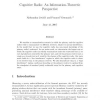Free Online Productivity Tools
i2Speak
i2Symbol
i2OCR
iTex2Img
iWeb2Print
iWeb2Shot
i2Type
iPdf2Split
iPdf2Merge
i2Bopomofo
i2Arabic
i2Style
i2Image
i2PDF
iLatex2Rtf
Sci2ools
CORR
2006
Springer
2006
Springer
Cognitive Radio: An Information-Theoretic Perspective
We consider a communication scenario in which the primary and the cognitive radios wish to communicate to different receivers, subject to mutual interference. In the model that we use, the cognitive radio has non-causal knowledge of the primary radio's codeword. As our main result, we characterize the largest rate at which the cognitive radio can reliably communicate under the constraint that (i) no rate degradation is created for the primary user, and (ii) the primary receiver uses a single-user decoder just as it would in the absence of the cognitive radio. Our main result holds in a "low interference" regime in which the cognitive radio is closer to its receiver than to the primary receiver. We also demonstrate that, in a "high interference" regime, multi-user decoding at the primary receiver is optimal from the standpoint of maximal jointly achievable rates for the primary and cognitive users.
Related Content
| Added | 11 Dec 2010 |
| Updated | 11 Dec 2010 |
| Type | Journal |
| Year | 2006 |
| Where | CORR |
| Authors | Aleksandar Jovicic, Pramod Viswanath |
Comments (0)

